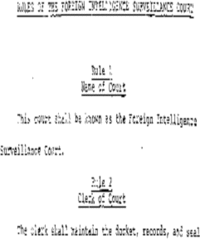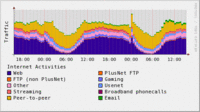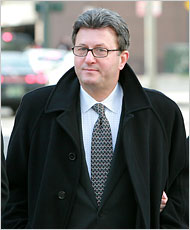
The FCC won’t investigate possible illegal telco activities:
The head of the U.S. Federal Communications Commission declined to
investigate reports that phone companies turned over customer records
to the National Security Agency, citing national security concerns,
according to documents released on Friday.
FCC Chairman Kevin Martin turned down a congressional request for an
investigation as a top intelligence official concluded it would “pose
an unnecessary risk of damage to the national security,” according to a
letter National Intelligence Director Michael McConnell sent to Martin
on Tuesday.
—
FCC won’t probe disclosure of phone records,
By Reuters,
October 6, 2007, 4:00 PM PDT
It seems
unlikely the FCC will investigate active wiretapping, either.
National security: the root password to the Constitution.
But Congress won’t let the telcos off the hook, well, not completely:
House Democrats have refused to submit to Bush administration requests
to save telecommunications companies that assisted in a warrantless
wiretapping scheme from lawsuits or prosecution, and they want to require
judicial approval for future efforts to spy on Americans.
…
Under the new law, the Attorney General or Director of National
Intelligence would be authorized to receive blanket warrants to
eavesdrop on several foreign intelligence targets who could call into
the United States, but the bill would restore FISA court reviews of
targeting procedures and steps taken to “minimize” Americans’ exposure to
surveillance. If an American is to become the “target” of surveillance,
intelligence agencies would be required to seek an individualized warrant
from the FISA court.
—
Proposed FISA update would not give telecom companies legal protection,
by Nick Juliano,
RawStory,
Tuesday October 9, 2007
The Foreign Intelligence Surveillance Court already is so secretive
that although its court rules say it has a seal, there’s no image
of it available anywhere on the web that I could find,
and it already lets intelligence agencies apply within a few
days for retroactive authorization for wiretaps.
Of course, this bill would have to pass the Senate and get signed
by the president or get enough votes to override a veto.
But at least the former law didn’t retroactively immunize the telcos,
and this bill doesn’t, either.
-jsq
 Well, this is news:
Well, this is news:








